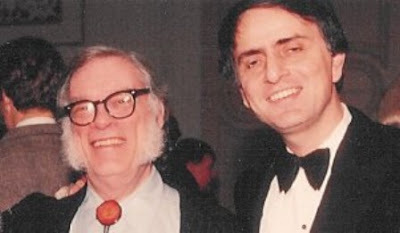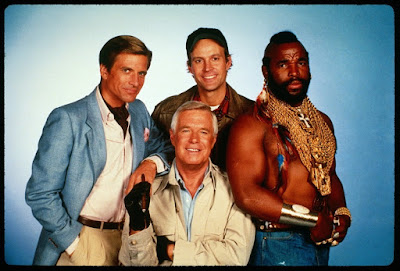I've been very busy recently, or at least very occupied. So, to keep the blog ticking over, here is an article that I had published in the Catholic Voice newspaper in 2014.
A Much-Vexed WordWhat did Carl Sagan, Arthur C. Clarke, Isaac Asimov and Jean Paul Sartre all have in common? Your first answer might be, “They were all atheists”, and that would certainly be true. But another thing they have in common is that they are all listed on the website of the Humanist Association of Ireland as famous humanists.
 |
| Isaac Asimov and Carl Sagan |
It would seem, according to this organisation, that a humanist is necessarily an atheist. Indeed, their description of humanism makes this clear: “Humanism is a view of life that combines reason with compassion. It is based on a concern for humanity in general, and for human individuals in particular. It is for people who base their interpretation of existence on the evidence of the natural world and its evolution, and not on belief in the supernatural (theistic god, miracles, afterlife, revealed morality etc.).”
So, can you be a humanist but not an atheist? And can a Christian be a humanist?
Jacques Maritain, the famous twentieth century Catholic philosopher, would certainly have answered “Yes!” to both questions. His book Integral Humanism greatly influenced the Christian Democratic movement in Europe. He also helped to draft the Universal Declaration of Human Rights.
Other Christians who are often considered to be humanists include St. John Paul II (who subscribed to a philosophy called personalism, which is a form of humanism), Dante, Chaucer, G.K. Chesterton, John Henry Newman, T.S. Eliot, and Pope Paul VI, whose closing address to the Second Vatican Council included these words: “We call upon those who term themselves modern humanists, and who have renounced the transcendent value of the highest realities, to give the council credit at least for one quality and to recognise our own new type of humanism: we, too, in fact, we more than any others, honour mankind.”
Does the question even matter? I think it does. As somebody who considers himself both a Catholic and a humanist, I believe that Christians should resist the efforts of secular humanists to take ownership of this term. I believe that nobody has a better entitlement to it than followers of Jesus Christ, since Christ (as we believe) chose to become human, told us that the Sabbath was made for man and not man for the Sabbath, and assured us that every hair on our heads has been counted.
What is Humanism?
Historically speaking, humanism has nothing at all to do with atheism. The universally recognised ‘Father of Humanism’ is Petrarch, the Italian poet who died in 1374. Petrarch was a devout Catholic whose interest in ancient Greece and Rome helped to bring about the Renaissance. Later on, Desiderius Erasmus and St. Thomas More both earned the title ‘humanist’, on account of their immersion in the classical past and their emphasis upon human reason. Both, of course, remained loyal Catholics—Erasmus refusing to join Luther’s rebellion against the Pope, and St. Thomas More sacrificing his life to defend the independence of the Church from the State.
What, then, is humanism?
The Oxford English Dictionary online offers three different definitions, and they are interestingly diverse. Here they are: “A rationalistic outlook or system of thought attaching prime importance to human rather than divine or supernatural matters; “a Renaissance cultural movement which turned away from medieval scholasticism and revived interest in ancient Greek and Roman thought”; and “(Among some contemporary writers) a system of thought criticized as being centred on the notion of the rational, autonomous self and ignoring the conditioned nature of the individual.”
But definitions in dictionaries and encyclopedias, though they are important, don’t tell us everything about how a word is used. What is interesting about the word ‘humanism’ is that it is used to mean such a variety of things, and to give a name to a particular spirit which is difficult to define but easy to recognise. Leaving out its use as a synonym for atheism, here are a few of the ways the term ‘humanism’ is used.
It is often used to mean something like ‘cosmopolitanism’. Humanists believe in the brotherhood (and sisterhood) of man, and that our affinity with the human race as a whole is more important than national or ethnic ties. (This doesn’t mean that national or ethnic ties aren’t important.)
In the field of psychology, ‘humanistic psychology’ is a departure from the rather bullish and anti-sentimental approach taken by Sigmund Freud and behaviourists such as B.F. Skinner (who wrote a book entitled Beyond Freedom and Dignity.) Humanistic psychologists tend to emphasise human freedom, creativity and the urge for wholeness, rather than seeing human beings as creatures at the mercy of their irrational impulses or social conditioning. They also tend to respect mankind’s spiritual aspirations.
In the field of literature, ‘liberal humanism’ is a school of criticism associated with F.R. Leavis and Matthew Arnold. They believed that literature speaks to something permanent and unchanging in human nature, and that the literary element in a book or poem is the most important thing about it. Anyone who has suffered through an English literature course in a modern university, with its obsession with feminist, post-modernist, post-colonial and
‘Deconstructionist’ theories—all of which are more interested in politics, and in the sex and colour and social class of the writer, than in the actual literary value of the work—will appreciate this school of thought.
Finally, humanism is generally considered to be an optimistic outlook. Humanists have faith in the ability of humans to rationally overcome social problems, faith in the intrinsic goodness of humanity, and faith in the ability of the human mind to comprehend reality.
If this is a fair description of the range of attitudes that belong under the term ‘humanism’, then I believe that humanism goes better—much, much better—with a Christian view of the world than it does with the philosophy of the atheist and the scientific materialist.
Why is that? I will defend my claim, but first I want to indulge in a personal digression.
To Boldly Go…
Why do I even care about humanism? I hope the reader will not guffaw if I admit that the TV show Star Trek: The Next Generation has a lot to do with it. (Bear with me, please!)
Star Trek: The Next Generation is, as its name implies, the second series of the Star Trek franchise, set some years after the adventures of Captain Kirk, Doctor Spock and Scotty. Like the first series, it follows the crew of the Starship Enterprise as they explore the galaxy, and come into contact with a bewildering variety of life forms and civilisations.
Star Trek is notable for its high moral tone. There are no anti-heroes amongst its cast. The crew of the Starship Enterprise are portrayed as being very principled and idealistic. The conflicts they encounter are more often solved by reason, and by coming to a better understanding with their antagonists, than by violence. Off duty, they perform Shakespeare plays, attend poetry recitals, and pursue other worthy cultural pursuits.
Although human civilisation in Star Trek has reached a point where all material needs have been met (you can get any meal you want by just ordering it from a ‘replicator’) the show repeatedly makes the point that man does not live by technology alone. One character—the super-intelligent android Data—yearns to become more like his human colleagues, and is intrigued by human concepts such as love, humour, and imagination.
I actually believe that Star Trek played a part in forming my own Christian worldview. (I was a teenager when The Next Generation was being first broadcast.) The universe it portrayed was not hostile and alienating, but rather filled with wonders and with intelligent life. Good triumphs over evil, love over conflict, time and again. The human spirit and the human mind are seen to be at home in the cosmos. It is hard to escape the conclusion that, despite Roddenberry’s intentions, there is a loving Providence behind the Star Trek universe—and that this Providence takes a special interest in human beings.
In short, Star Trek played no small part in making me a humanist, a Christian, and a Christian humanist.
Why Christians are Humanists
And now, to return to the question I left dangling above—why do I believe that Christians have more of a right than atheists to call themselves humanists?
I believe this because, from an atheist or materialist point of view, there is really nothing special about human beings. We are simply the by-product of immutable, impersonal natural forces—just like a wave or a flame. There is no reason to believe that the human mind should enjoy a privileged insight into reality. (Indeed, historians of science have pointed out that modern science arose in a Christian context, as a result of the Christian faith that God’s universe was comprehensible.)
Humanists who are atheists, or scientific materialists, have no reason—other than pure sentimentality—to think that human nature is basically good. If we are entirely the products of evolution, of ‘nature red in tooth and claw’, why would it be? Christians, on the other hand—for all our belief in sin, and the Fall—have faith that we were created in the image and likeness of God, and that “everything created by God is good” (1 Timothy 4:4).
Christians—and especially Catholics—actually proclaim the dignity of man in a way that secular culture has never succeeded in doing. Christianity, as a universalist religion, has always rejected racist ideologies that portray some people as sub-human. Its missionaries have respected, and indeed nurtured, the native cultures they encountered. As well as this, Catholicism defends human life from the moment of conception to the moment of natural death, on the basis of the dignity of the person. (Secular humanism can’t even give us a useful definition of a human being!)
Catholic social teaching defends the dignity of the human person (and the dignity of the family) against untrammelled market forces on one hand, and the unrestricted power of the State on the other. Catholicism embraces a humanistic holism, promoting— to quote the magnificent words of Pope Paul VI—“the good of every man, and of the whole man”. Finally, Pope Benedict XVI, and the Church’s Magisterium, has often warned of the dangers of technology in a manner similar to that of Neil Postman.
Meanwhile, the materialistic philosophies of modernity have brought us ever closer to the bleak prediction of philosopher Michel Foucault, who—in 1966—foresaw the possibility that “man would be erased, like a face drawn in sand at the edge of the sea.”
So who, I ask, are the true humanists?

























